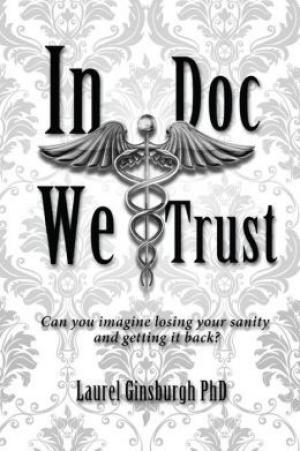'In Doc We Trust' explores gaps in psychiatric care
Lewes author Laurel Ginsburgh, Ph.D, is slated to sign her book, "In Doc We Trust," from 11 a.m. to 1 p.m., Saturday, March 12, at Lewes Public Library, and noon to 2 p.m., Saturday, March 19, at Rehoboth Pubic Library.
She said she hopes her story will illuminate a disturbing breach of trust that is growing in psychiatry.
Ginsburgh said her own story began in the late '70s when, when as a young doctoral candidate in her field of speech pathology at Columbia University, she came under the care of an abusive psychiatrist as she was contemplating divorce.
During the time she was under the care of her abusive psychiatrist, which lasted as long as four-and-a-half years, Ginsburgh said the doctor was cruel, belittled her and missed a diagnosis of depression that was a culprit in her low self-esteem and eventual psychosis.
"We treat doctors as Gods," she said. "In the beginning I think I did, and I paid him and did whatever he told me to do, even if it was hard to swallow. I put my faith in him completely. I trusted him."
For nearly two years, Ginsburgh said she was mostly bedridden and when she was not, her life centered around disguising her mental illness.
Her breakthrough came, she said, after reading a book by a forensic psychologist that helped her recognize her irrational feelings and guilt were stemming from depression, and she sought out a new practitioner whose therapy set the course for her recovery.
In early 1980, after her family discovered the damage her psychiatrist was doing, Ginsburgh said she found a new psychiatrist, Dr. Albert, who she credits with saving her life and thanks, posthumously, in her book.
She got a prescription for antidepressants and the subsequent talk therapy turned her life around,
"As I am recovering I did’t have my anger at the first doctor at first," Ginsburgh said, "until I realized I spent four-and-a-half years being treated so cruelly. He told me I was often not a very nice person, that psychosis was 'my word' and he was horrible."
More than anything, Ginsburgh said she hopes her ordeal prompts the public to take a sharper look at the state of psychiatry and mental health treatment.
"Psychiatric patients are so vulnerable," Ginsburgh said. "What happened to me is extreme but not really unique. Your psychiatrist needs to be working for you, with you and not against you."






















































